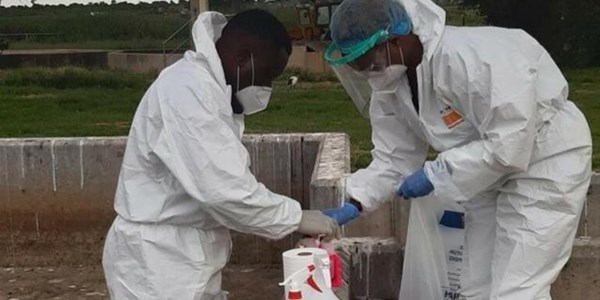South Africa
#Covid19: Wastewater surveillance could help spot third wave─── 15:03 Mon, 07 Jun 2021

Every week staff from the South African Medical Research Council's (SAMRC) wastewater surveillance programme collect samples from wastewater treatment plants in the Eastern Cape, Western Cape, Limpopo, and Gauteng.
These samples are then tested for fragments of SARS-CoV-2, the virus that causes COVID-19.
The data generated in this way is then shared with the public on a dashboard on the SAMRC website that is updated weekly. If a substantial third wave of COVID-19 is to hit South Africa, chances are it will be evident in this data.
Early warning system
“Wastewater has historically been used as an early warning system to identify various pathogens, including polio and hepatitis. This same concept can now be used in the detection of Covid-19 in wastewater,” explains Doctor Rene´e Street, a specialist scientist in the Environment and Health Research Unit at the SAMRC. “Wastewater surveillance can be a useful part of a broader COVID-19 response strategy to track trends of COVID-19, but it should not be interpreted in isolation,” she says.
“Shedding of the SARS-CoV-2 virus that causes COVID-19 may happen soon after a person is infected, both in asymptomatic and symptomatic cases. But there can be a delay in the first signs and symptoms before a person gets tested for COVID-19 and another delay before test results are available,” she says. “In fact, some people who are infected never show symptoms (asymptomatic) and therefore may never get tested.”
But as Street points out, whether or not people show, they can shed the virus and this can then be detected in wastewater.
“Wastewater surveillance is monitoring the levels of SARS-CoV-2 RNA fragments (parts of the virus) in wastewater and gives us an indication of the caseload of COVID in the population,” explains Doctor Natacha Berkowitz, an epidemiologist with the City of Cape Town. The city has been at the forefront of the country’s wastewater surveillance efforts.
Berkowitz says this surveillance may alert us to the possibility of a third wave as people can excrete virus for as long as two weeks prior to showing symptoms. “If we start getting very high levels of virus in the wastewater, that would make one concerned. However, we are still analysing the utility of this data to better understand what level of viral RNA would alert us to a resurgence,” she says.
She says they still need to compare the data to the caseload in the population. “This will help us decide what level of viral RNA detection would alert us to a resurgence. Additionally, people move around (for work, etc.), so high levels in one treatment works may not reflect accurately the caseload in its drainage area. High viral RNA levels also need to be standardised against population figures and flow rates.”
According to Street, wastewater testing thus allows for the screening of hundreds and thousands of people with a single wastewater sample, which makes it a relatively cost-effective alternative to mass clinical testing of communities. “A SARS-CoV-2 early warning system could be of particular importance for low- and middle-income countries where resources may be limited,” says Street. “An effective early warning system could be used to identify COVID-19 hotspots, and guide action and the distribution of resources, including testing, tracing and preparedness strategies for COVID-19.”
Tracking other diseases
Street says that wastewater surveillance can be used for a range of pathogens, including polio and measles, but also extends to other areas of research including pharmaceutical and illicit drug use. “If pathogens can be found in stool and, or urine (like SARS-CoV-2) then this a good starting point but not all pathogens are suitable for wastewater surveillance,” she says.














